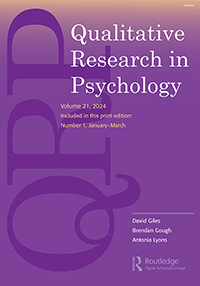When do arts-based methodologies work?: a case illustration involving newcomer experiences and knowledge-production in community-based research
IF 4.4
3区 心理学
Q1 PSYCHOLOGY, MULTIDISCIPLINARY
引用次数: 0
Abstract
ABSTRACT This paper discusses the joint-knowledge production that emerged through a community-based research project conducted in partnership with a social service organization. Specifically, we present an unanticipated metaphor (‘Canada is clean’) that became evident through utilizing an art-based methodology. The methodology had five participants assemble photo-diaries over the span of two weeks. Participants took (unedited) photographs of themselves and their environments using their smartphone. The photo diaries were then presented to two focus groups: (1) a group of consumer-recipients of the social service organization and (2) a group of program workers. The focus groups were analyzed through Interpretive Phenomenological Analysis tailored for assessing groups. We address the meaning of the central metaphor, though place an emphasis on the milieu that promoted its co-construction and thereby upon the conditions that enabled arts-based research to succeed.基于艺术的方法论何时有效?:社区研究中涉及新经验和知识生产的案例说明
摘要本文讨论了通过与社会服务组织合作开展的基于社区的研究项目而产生的联合知识生产。具体来说,我们提出了一个意想不到的隐喻(“卡纳达是干净的”),通过利用基于艺术的方法变得显而易见。该方法让五名参与者在两周内收集照片日记。参与者使用智能手机拍摄自己和周围环境的照片(未经编辑)。照片日记随后被呈现给两个焦点小组:(1)社会服务组织的一组消费者接受者和(2)一组项目工作者。焦点小组通过为评估小组量身定制的解释现象学分析进行分析。我们讨论了中心隐喻的含义,但强调了促进其共同构建的环境,从而强调了使基于艺术的研究取得成功的条件。
本文章由计算机程序翻译,如有差异,请以英文原文为准。
求助全文
约1分钟内获得全文
求助全文
来源期刊

Qualitative Research in Psychology
PSYCHOLOGY, MULTIDISCIPLINARY-
CiteScore
20.00
自引率
0.50%
发文量
14
期刊介绍:
Qualitative Research in Psychology is an international, peer-reviewed journal that publishes high-quality, original research. It aims to become the primary forum for qualitative researchers in all areas of psychology, including cognitive, social, developmental, educational, clinical, health, and forensic psychology. The journal also welcomes psychologically relevant qualitative research from other disciplines. It seeks innovative and pioneering work that advances the field of qualitative research in psychology.
The journal has published state-of-the-art debates on various research approaches, methods, and analytic techniques, such as discourse analysis, interpretative phenomenological analysis, visual analyses, and online research. It has also explored the role of qualitative research in fields like psychosocial studies and feminist psychology. Additionally, the journal has provided informative articles on ethics, transcription, interviewee recruitment, and has introduced innovative research techniques like photovoice, autoethnography, template analysis, and psychogeography.
While the predominant audience consists of psychology professionals using qualitative research methods in academic, clinical, or occupational settings, the journal has an interdisciplinary focus. It aims to raise awareness of psychology as a social science that encompasses various qualitative approaches.
In summary, Qualitative Research in Psychology is a leading forum for qualitative researchers in psychology. It publishes cutting-edge research, explores different research approaches and techniques, and encourages interdisciplinary collaboration.
 求助内容:
求助内容: 应助结果提醒方式:
应助结果提醒方式:


